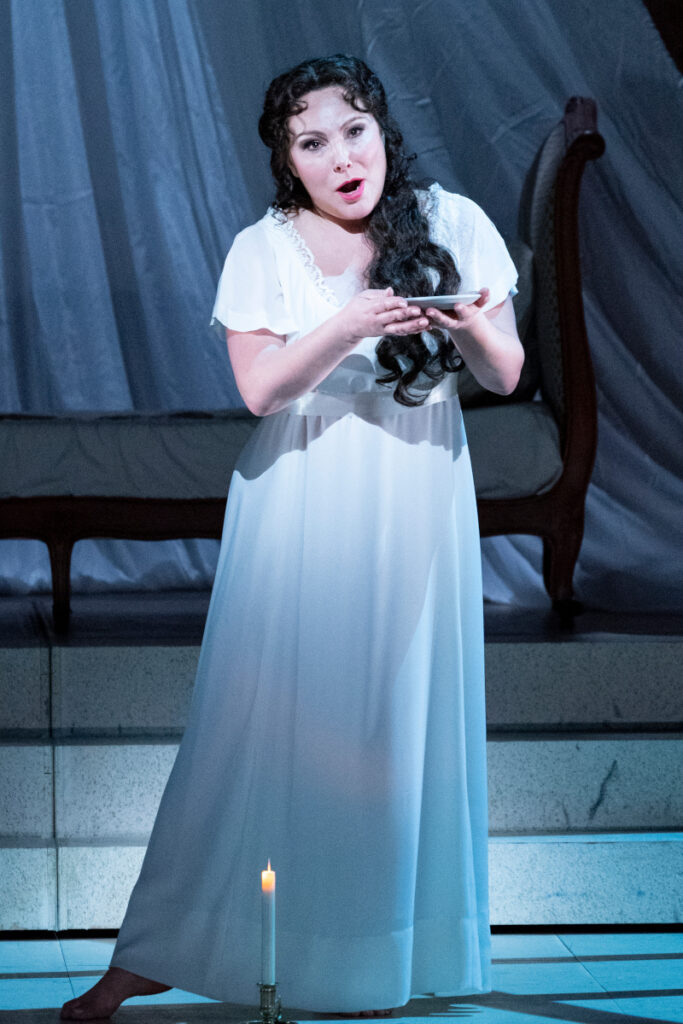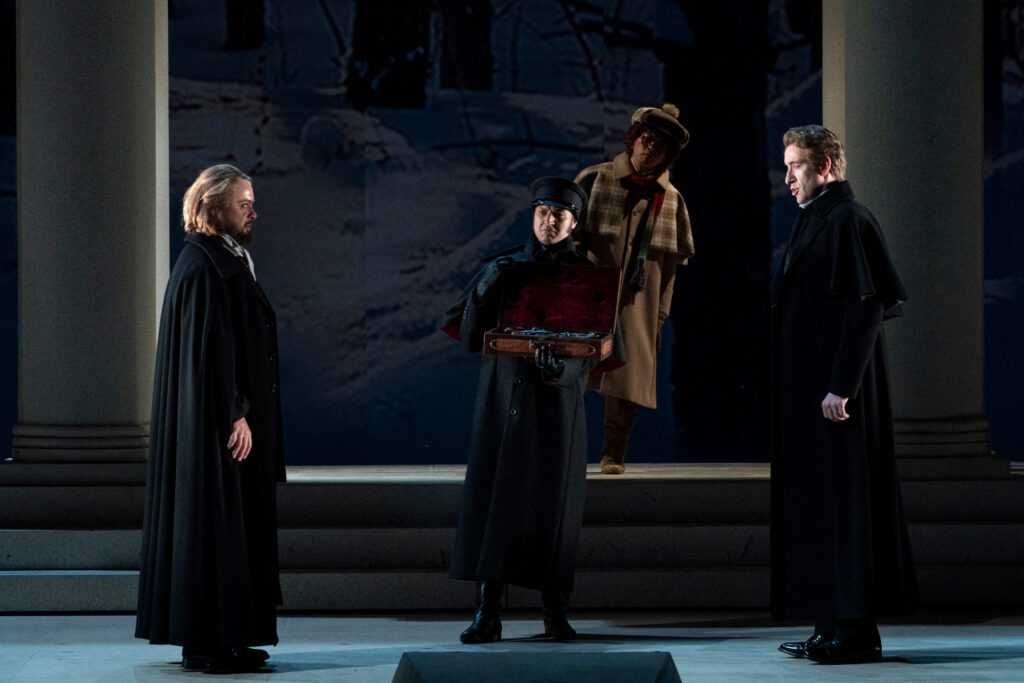First unveiled in 2019 (reviewed by David Chandler here: The New Season at the New National Theatre, Tokyo – Opera Today), this revival of Dmitry Bertman’s Eugene Onegin – his 9th production of this romantic opera – was seen on February 3 and hugely welcomed at the New National Theatre, Tokyo. The auditorium was absolutely packed with Tchaikovsky lovers, and their average age seemed somewhat younger than that of regular patrons of this theatre. In his Production Note, Bertman wrote: “the amazing Japanese audience, like no one else, is able to appreciate the depth, subtlety and versatility of the great Russian theatrical tradition.”
Performances were generally of a high standard. Of the main soloists, three Russians and two Ukrainians – all making their house debut – were particularly engaging. Their strongly united artistic endeavour, almost inevitably suggesting a political point, drew a full 15 minutes of applause at the end.

The de facto protagonist, Tatyana, was convincingly portrayed by the Russian soprano Ekaterina Siurina. Although she did not look very much like a bookish, lovelorn teenage girl in Act 1, her versatile voice gradually revealed everything in this deeply affectionate character. The celebrated letter aria was sung emotively with impeccable technique. The most intense line, “Kto ti, moi angel li khranitel?” (Who are you – my guardian angel?), was especially touching, an angelic sound as if from heaven. The transformation from a shy, self-doubting girl to a determined, unleashed young woman overnight was superbly performed both vocally and dramatically.
In the title role, Ukrainian baritone Yuriy Yurchuk gave a well-defined portrait. His Onegin, stylishly attired by Tatiana Tulubieva, looked aloof and irresistible, greatly helped by his well-proportioned tall figure with a natural elegance. One had to suspect that his good looks had helped fill the auditorium. Vocally, though, he was overpowered by the other principals and massive chorus most of the time, ironically betraying the vain persona of the parodied Byronic (anti-)hero. He was at his best in his outbursts to the now unattainable Tatyana at the end of Act 3.
As the besotted Lensky, Russian tenor Viktor Antipenko impressed with his blazing yet tender voice. His impassioned farewell to life, “Kuda, kuda vi udalilis” in Act 2, was sung as soon as it was written as a last love letter to his fiancée Olga – only for him to burn it at the end of this pensive aria. Though much less physically imposing than his graceful friend-turned-enemy, Antipenko’s Lensky was far more stirring throughout the show.
Olga was charmingly represented by the Russian mezzo Anna Goryachova. Her combination of a slim figure, mature complexion, coquettish demeanour and a mellow, silky lower voice à la Nathalie Stutzmann was highly intriguing. As Prince Gremin, Ukrainian bass Alexander Tsymbalyuk prompted enthusiastic applause for his exquisite aria in Act 3. His sonorous and soothing voice, along with his noble figure, was truly scene-stealing.

Elsewhere, Tadahiro Masujima’s Monsieur Triquet, a little French poet played as a drunken jester, amused the audience. His couplets for Tatyana were first sung in Russian, and then in his supposed mother tongue – inebriated hence almost inaudible. A clever stage direction, properly fulfilled. Akiko Goke’s Madama Larina and Yuka Hashizume’s Fillipyevna were pleasantly sung with plenty of amusing gestures.
In the pit, Valentin Uryupin directed a polished Tokyo Symphony Orchestra, pushing them along with style and accumulating vigour. Cellos and woodwinds were especially eloquent in the prelude to Lensky’s aria. The ensemble numbers and singing from the chorus were brilliant both on and off stage. Their self-consciously “vulgar” behaviours as villagers and even as courtiers made a clear contrast to the more “elegant” drama of the main cast. It would be interesting to see this in reverse: all five principal roles sung by Japanese and the rest entrusted to Russian/Ukrainian singers – would it present a similar elegant/vulgar contrast?
Natsuko Hirakura
Tatyana – Ekaterina Siurina, Eugene Onegin – Yuriy Yurchuk, Vladimir Lensky – Viktor Antipenko, Olga – Anna Goryachova, Prince Gremin – Alexander Tsymbalyuk, Madama Larina – Akiko Goke, Fillipyevna – Yuka Hashizume, Zaretsky – Vitaly Yushmanov, Monsieur Triquet – Tadahiro Masujima
Conductor – Valentin Uryupin, Production – Dmitry Bertman, Set Design – Igor Nezhny, Costume Design – Tatiana Tulubieva, Lighting Design – Denis Enyukov, Choreographer – Edvald Smirnov, Revival Director – Yasuko Sawada
New National Theatre Chorus, Tokyo Symphony Orchestra
New National Theatre Tokyo, Saturday 3rd February 2024
All photographs © Rikimaru Hotta